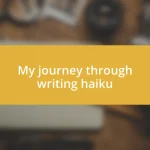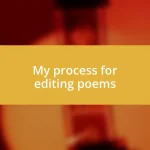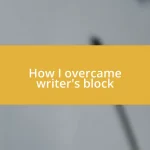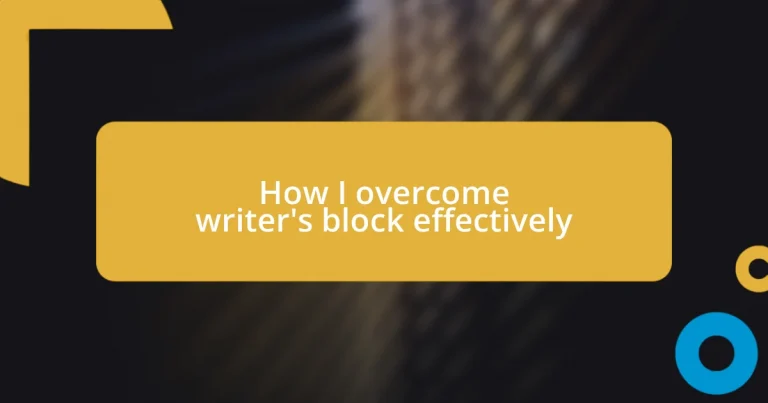Key takeaways:
- Writer’s block is often triggered by self-doubt, perfectionism, and environmental distractions, highlighting the psychological barriers that can impede creativity.
- Implementing practical strategies such as setting a timer, breaking tasks into smaller parts, and varying routines can effectively help overcome writer’s block.
- Seeking support and feedback from peers and engaging in mindfulness and creative exercises foster a sense of community and can reignite inspiration.
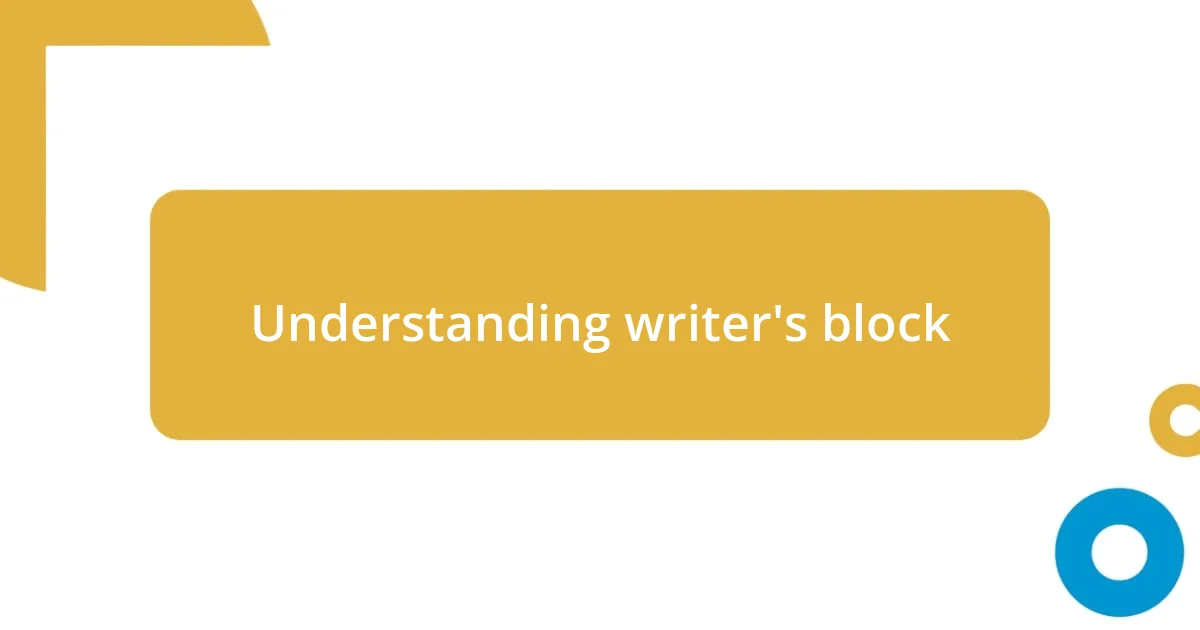
Understanding writer’s block
Writer’s block can feel like running headfirst into a brick wall. At times, I’ve found myself staring at a blank screen for what felt like hours, my mind racing with ideas but unable to land on any of them. It’s a frustrating experience that many writers share, yet it often brings up deeper emotions like self-doubt and anxiety.
Understanding this phenomenon goes beyond just identifying the block itself; it’s also about exploring what triggers it. I remember a time when a looming deadline had me paralyzed, constantly questioning if my ideas were good enough. Have you ever felt the weight of expectation so heavily that it stifles your creativity? That pressure can be a significant barrier, highlighting that writer’s block isn’t simply about a lack of inspiration, but often about fear and expectation.
Another aspect of writer’s block involves the relationship between our environment and creativity. I’ve discovered that cluttered spaces or noisy surroundings can sap my focus and inhibit my flow. It’s curious how a change of scenery can sometimes jumpstart my imagination. Have you ever tried writing in a different location or even just rearranging your desk? These small shifts can make a substantial difference in overcoming those frustrating blocks.
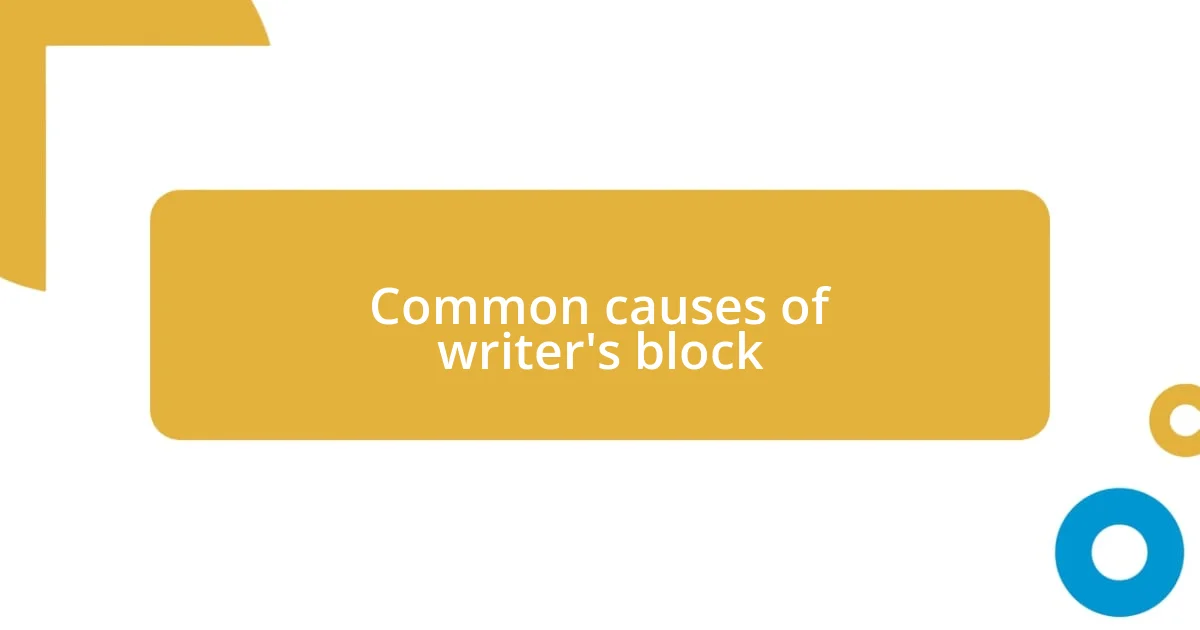
Common causes of writer’s block
It’s interesting how the psychological aspects of writing can often trip us up. For instance, I remember one particular phase when I was both exhausted from juggling multiple projects and grappling with perfectionism. The idea of producing something “perfect” held me back, and instead of writing, I found myself paralyzed by the fear of imperfection. I think this is a common struggle—when the desire for a flawless piece overshadows the simple act of writing, that’s a surefire recipe for a creative standstill.
Writer’s block can often be traced back to specific triggers that affect our mindset. Here are some common causes I’ve encountered and observed in others:
- Self-doubt: Questioning your abilities or fearing judgment can be crippling.
- Perfectionism: Striving for an unattainable ideal often leads to stagnation.
- Burnout: Feeling overwhelmed can drain your motivation and creativity.
- High expectations: Struggling under the pressure of deadlines or your own standards can stifle creativity.
- Environmental distractions: A cluttered or noisy space can pull you away from your flow.
Recognizing these causes has been a crucial step in my journey to overcoming writer’s block, helping me reframe how I approach my writing process.
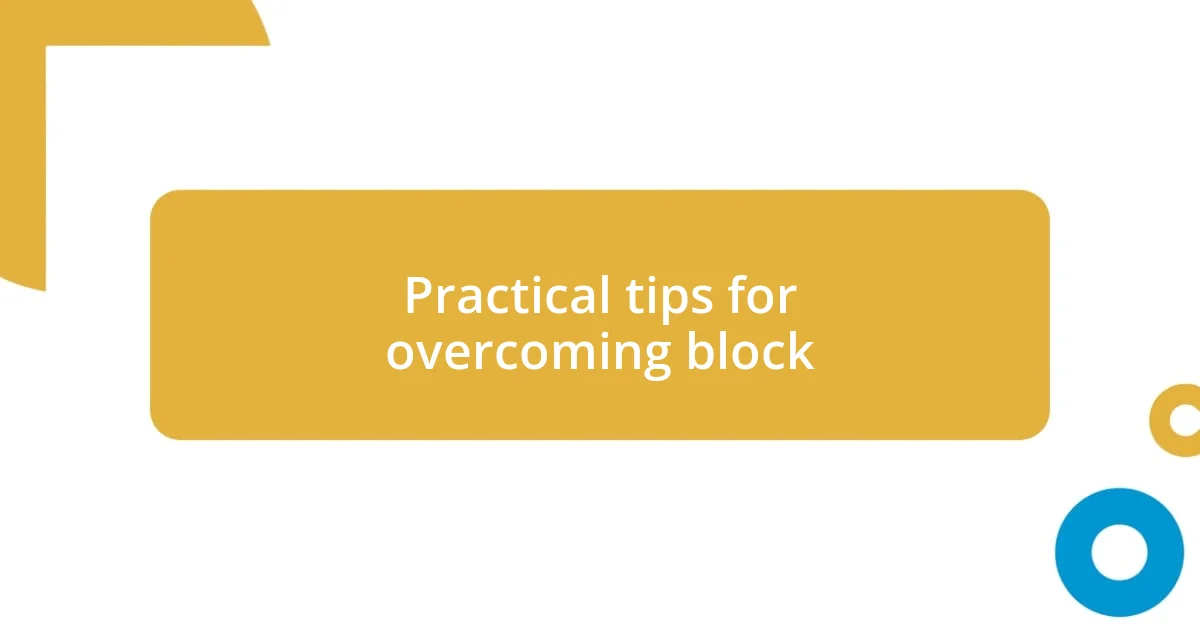
Practical tips for overcoming block
One of my go-to strategies for overcoming writer’s block is to set a timer for just ten minutes. When I feel stuck, committing to such a short period makes writing feel less daunting. I find that once I start, the words flow more easily, almost like a tap being turned on. Have you experienced this? Sometimes, it’s the sheer act of writing, even if it feels forced, that loosens the creative gears.
Another effective approach has been breaking my work into smaller tasks. Instead of tackling an entire chapter at once, I’ll focus on a single paragraph or even just a sentence. This shift in focus makes the project feel more manageable and reduces the overwhelm that often triggers writer’s block. I vividly recall a time when I faced a complex topic; breaking it into bite-sized chunks helped me not only progress but also rediscover my excitement for the subject.
Finally, don’t underestimate the power of a change in routine. I like to switch up my writing process by experimenting with different techniques, such as mind mapping or free writing. This playful exploration keeps my creativity alive and often leads me down unexpected paths. Have you noticed how stepping away from your usual approach can reveal hidden ideas? Sometimes, the key to unblocking creativity lies in shaking up the familiar.
| Tip | Description |
|---|---|
| Set a Timer | Write for just ten minutes to reduce overwhelm. |
| Break Tasks Down | Focus on one small segment instead of the whole piece. |
| Change Your Routine | Experiment with different writing techniques to reignite creativity. |
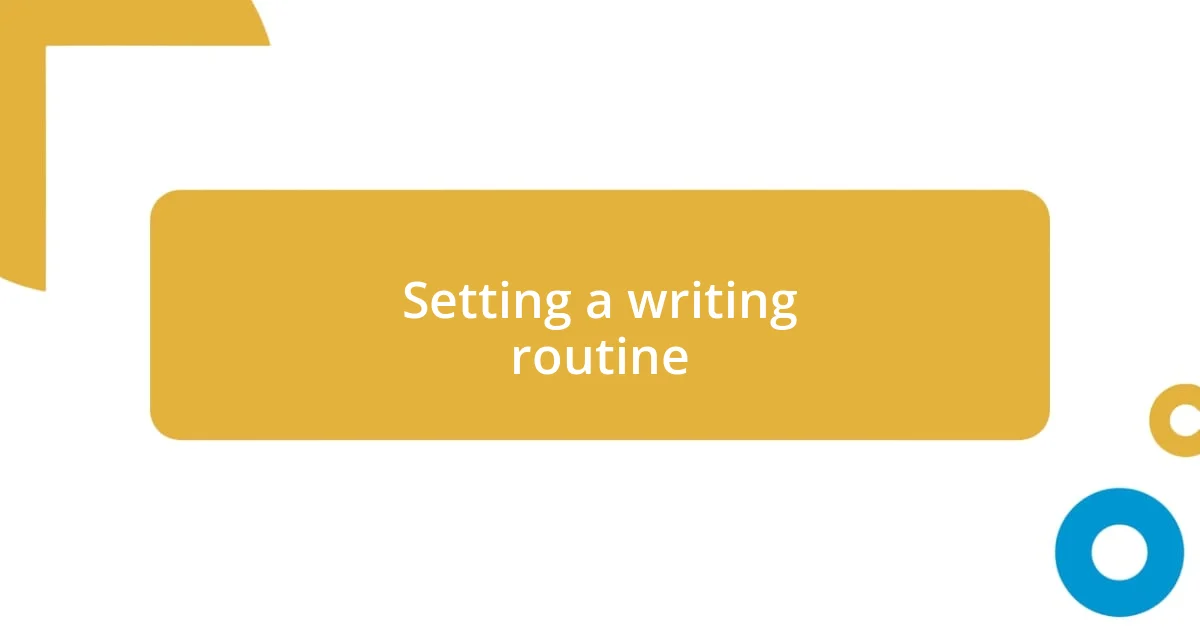
Setting a writing routine
Establishing a writing routine has been a game-changer for me. I find that writing at the same time every day creates a sense of rhythm and expectation. It’s like training my brain to know when it’s time to be creative, similar to how athletes prepare for practice. Have you ever noticed how, when you do something consistently, it becomes almost second nature?
I remember when I first committed to a daily writing schedule. Initially, I struggled to sit down and focus at the same hour each day. However, over time, it transformed into a cozy ritual—my morning coffee in hand, my favorite chair, and the soft sound of classical music in the background. This consistent environment signaled my mind to shift into writing mode, making the process feel more inviting and less daunting.
Another tip that worked wonders for me is setting specific goals within my routine. Rather than just saying, “I’ll write today,” I’d tell myself, “I’ll write 500 words or complete one section of my article.” This clarity gives me a tangible target to aim for, igniting motivation as I inch closer to that goal. Have you tried establishing measurable targets in your writing? It could be the spark you need to push through those blocks.
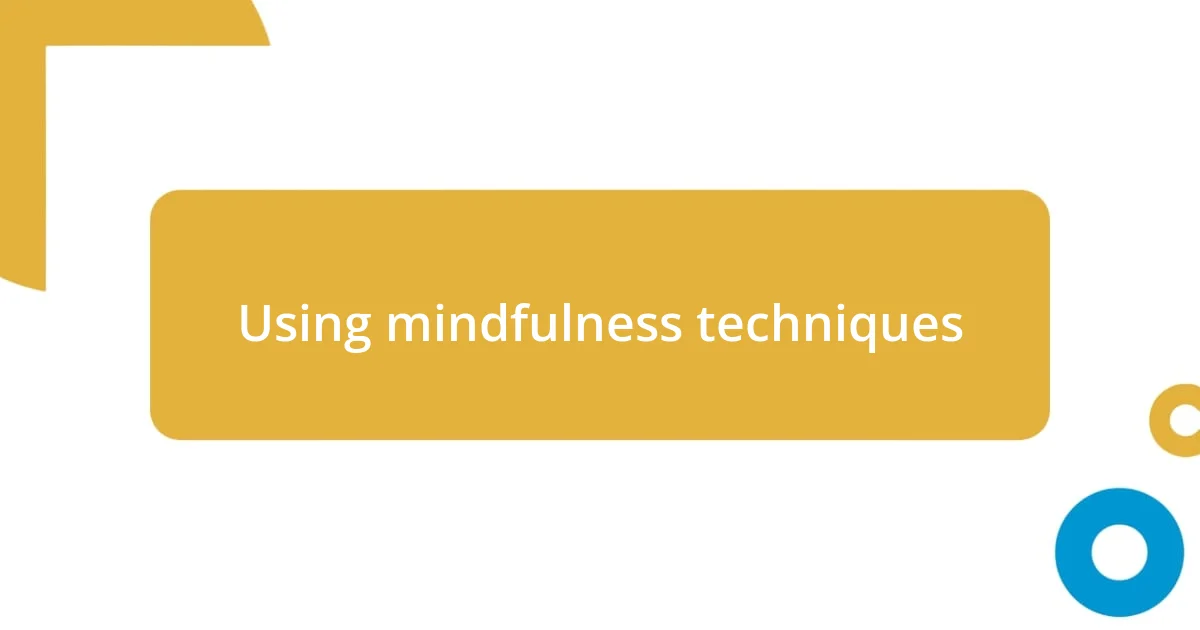
Using mindfulness techniques
One of the most powerful mindfulness techniques I’ve found is simply taking a moment to breathe. When I feel the weight of writer’s block, I close my eyes and take a deep breath, focusing all my attention on the air filling my lungs. I’ve realized that this small act can ground me, bringing clarity and easing the tension in my mind. Have you ever noticed how just a few seconds of mindful breathing can dissolve distractions?
Incorporating a short meditation session into my routine has also made a significant difference. I remember one particularly frustrating day when words just wouldn’t come. After a five-minute meditation, I felt more centered and connected to my thoughts. This practice allows me to reframe my mindset, transforming anxiety about writing into curiosity about what I might discover on the page. Isn’t it fascinating how stepping back for a moment can lead to breakthroughs in inspiration?
Another effective strategy is mindful observation. I sometimes take a walk outside and focus on the details around me—the rustling leaves, the fading light, or even the distant sound of laughter. Engaging my senses in this way stimulates my creativity and often sparks ideas I didn’t even know were lurking. Have you found that disconnecting from the screen and immersing yourself in the present can clear the fog of writer’s block? It’s a refreshing reminder that inspiration can come from the simplest of moments.
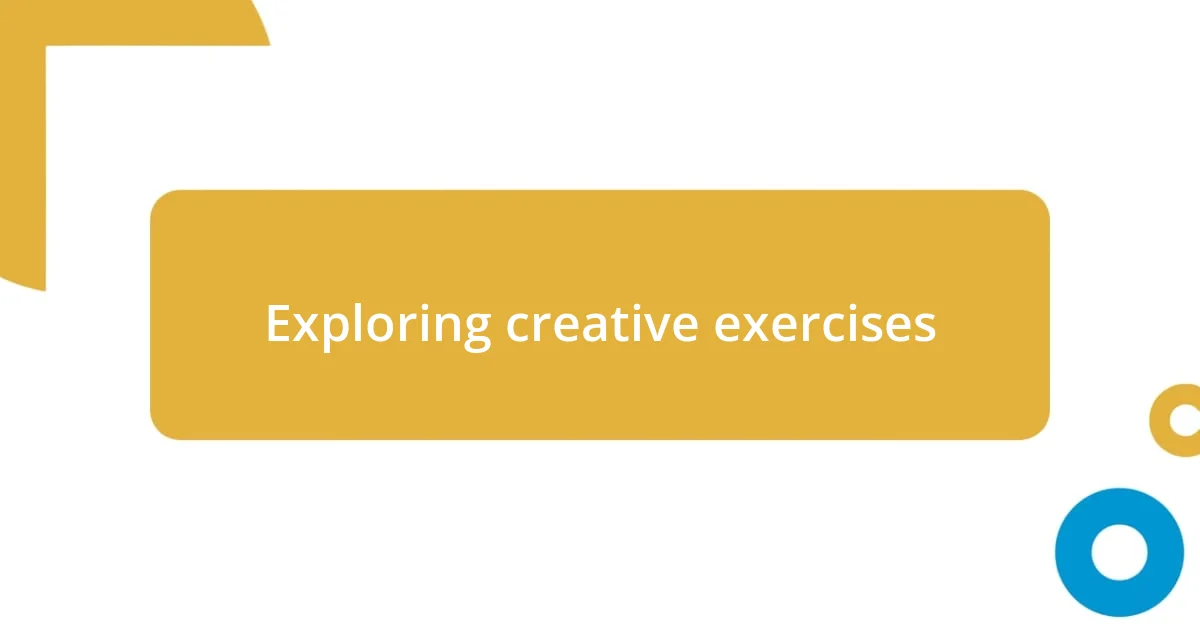
Exploring creative exercises
Creative exercises are a fantastic way to shake off the cobwebs of writer’s block. I often turn to free writing, where I set a timer for ten minutes and let my thoughts flow onto the page without worrying about structure or grammar. This process feels liberating—like a rush of emotions spilling out—and it’s not unusual for hidden gems of inspiration to emerge from that seemingly chaotic stream of consciousness. Have you ever experienced that exhilarating feeling of letting go of control?
Another exercise that has done wonders for me is the “word association” game. I write down a random word and then list everything that comes to mind in relation to it. One day, the word “ocean” led me from thoughts of waves to memories of beach trips, evoking a sense of calm and nostalgia. These associations not only stir creativity but also spark memories that enrich my writing. Have you tried this simple yet effective method to breeze through mental roadblocks?
I also enjoy incorporating visual prompts into my writing exercises. Whether it’s a photo, a piece of art, or even a scene from a movie, visuals can ignite my imagination like nothing else. I remember a day when I stumbled upon a vibrant painting of a sunset, and it instantly transported me to a serene beach where I could almost hear the waves crashing. This technique connects me to my emotions and often leads to stories I didn’t know I had inside me. Do you think a simple image could be the trigger you need to unleash your creativity?
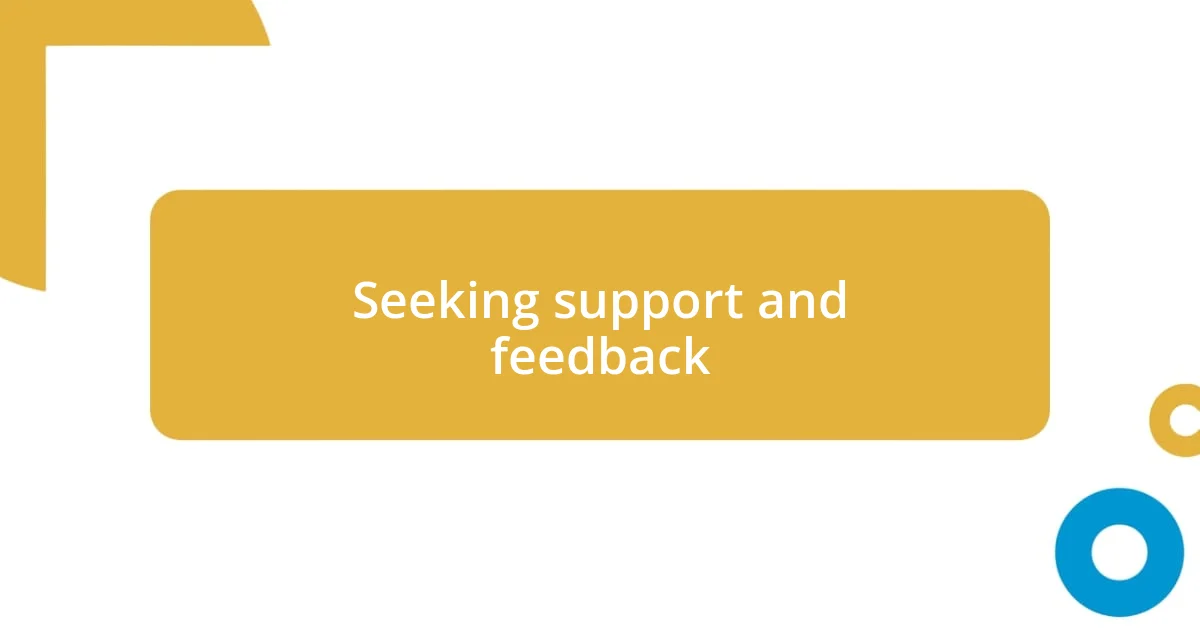
Seeking support and feedback
Reaching out for support can be a game-changer when I’m feeling stuck. I remember one day vividly when I hit a wall with a project. Instead of sulking alone, I called a fellow writer for a brainstorming session. Their fresh perspective opened up new avenues for my story that I hadn’t even considered. Have you ever found that sharing your struggles with someone else can lead to unexpected breakthroughs?
Feedback can be a double-edged sword; it can be intimidating. Yet, I’ve learned that constructive criticism is a crucial ingredient in my growth. I still recall a workshop I attended where peers provided insightful feedback on my writing style. The experience was nerve-wracking, but it ultimately helped me refine my voice. Have you ever faced the fear of judgment only to realize that feedback is an opportunity for transformation?
Support networks such as writing groups also play a vital role in my creative process. Being part of a community where I can share ideas and experiences fosters a sense of belonging. I once participated in a local group where we exchanged our works-in-progress. Hearing others’ feedback reminded me that I’m not alone in my struggles, reinforcing the idea that collaboration can spark creativity. Don’t you think there’s magic in sharing our journeys with others on similar paths?
